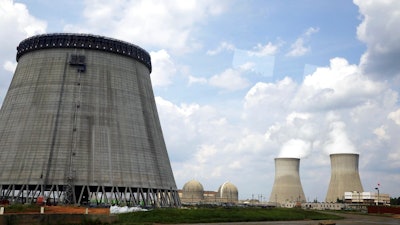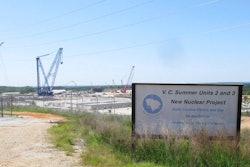
TOKYO (AP) — Money-losing Japanese nuclear and electronics company Toshiba Corp. will pay $3.68 billion toward the construction of two reactors in Georgia by its U.S. unit Westinghouse, which has filed for bankruptcy protection.
Tokyo-based Toshiba said Saturday the payment, under agreement with the operator of the Vogtle plant, will be made from October through January 2021.
Toshiba said the expense has already been figured in its earnings. Toshiba reported a 950 billion yen ($8.6 billion) loss for the fiscal year ended March.
Paul Bowers, chief executive of Georgia Power, the utility working with Westinghouse to expand Vogtle, welcomed the deal.
"We are pleased with today's positive developments with Toshiba and Westinghouse that allow momentum to continue at the site while we transition project management from Westinghouse to Southern Nuclear and Georgia Power," he said referring to his company and its parent.
Costs in the nuclear industry have ballooned since the March 2011 nuclear disaster in northeastern Japan, as safety requirements get tougher and the construction of the Westinghouse reactors has fallen behind schedule. Toshiba is still in similar talks over a South Carolina plant about such payments.
Toshiba's shouldering Westinghouse's costs was part of the initial 2008 reactor construction deal, and the latest agreement sets the maximum for the payment, according to Toshiba.
Toshiba's earnings reports have failed to get endorsements from its auditors, given the company's precarious finances over the U.S. projects. The reports are being given as projections, not results.
To stay afloat, Toshiba has been trying to sell its lucrative computer chip business. Even that effort has not gone smoothly. Toshiba is wrangling with Western Digital of the U.S., which has acquired some SanDisk operations, including a joint venture with Toshiba in Japan.
Toshiba President Satoshi Tsunakawa has acknowledged the company strategy based on Westinghouse was a mistake, but has stressed he doesn't think Western Digital can block Toshiba in the chip sale.
Nuclear power will continue to be a major part of Toshiba's shrinking business.
It is still responsible for more than a dozen plants in Japan, including decommissioning Fukushima Dai-ichi nuclear plant, where three reactors sank into meltdowns after the 2011 tsunami, in the worst nuclear disaster since Chernobyl.





















